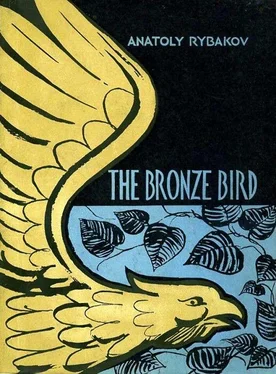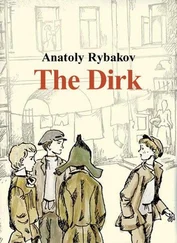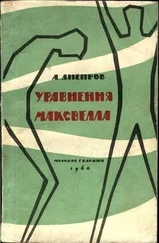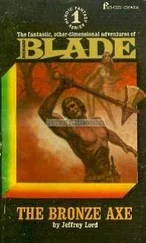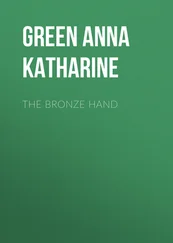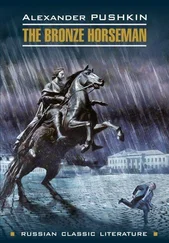Anatoly Rybakov - THE BRONZE BIRD
Здесь есть возможность читать онлайн «Anatoly Rybakov - THE BRONZE BIRD» весь текст электронной книги совершенно бесплатно (целиком полную версию без сокращений). В некоторых случаях можно слушать аудио, скачать через торрент в формате fb2 и присутствует краткое содержание. Город: Moscow, Год выпуска: 1956, Издательство: Foreign Languages Publishing House, Жанр: Детские приключения, Детектив, Исторические приключения, на английском языке. Описание произведения, (предисловие) а так же отзывы посетителей доступны на портале библиотеки ЛибКат.
- Название:THE BRONZE BIRD
- Автор:
- Издательство:Foreign Languages Publishing House
- Жанр:
- Год:1956
- Город:Moscow
- ISBN:нет данных
- Рейтинг книги:5 / 5. Голосов: 1
-
Избранное:Добавить в избранное
- Отзывы:
-
Ваша оценка:
- 100
- 1
- 2
- 3
- 4
- 5
THE BRONZE BIRD: краткое содержание, описание и аннотация
Предлагаем к чтению аннотацию, описание, краткое содержание или предисловие (зависит от того, что написал сам автор книги «THE BRONZE BIRD»). Если вы не нашли необходимую информацию о книге — напишите в комментариях, мы постараемся отыскать её.
THE BRONZE BIRD — читать онлайн бесплатно полную книгу (весь текст) целиком
Ниже представлен текст книги, разбитый по страницам. Система сохранения места последней прочитанной страницы, позволяет с удобством читать онлайн бесплатно книгу «THE BRONZE BIRD», без необходимости каждый раз заново искать на чём Вы остановились. Поставьте закладку, и сможете в любой момент перейти на страницу, на которой закончили чтение.
Интервал:
Закладка:
That was what happened now. At first, the chairman laughed at the way Stepan Kondratyevich had painted the club, but Yerofeyev said:
"It may be funny, but the money is from our pockets. How can we show this to the comrades from the gubernia or uyezd? It will all have to be redone and that means more expense. We can't afford to throw money about like that."
"It's not a lot of money," the chairman protested.
"That may be so, but it's public money," Yerofeyev said.
"It's gone and there's no use crying about it," the chairman frowned.
"That wasn't what I meant," Yerofeyev declared. "You're right, it's gone and we can't do anything about it. What I meant was that you can't trust children with this sort of thing. Can we blame Stepan Kondratyevich? He likes to paint houses, we all know that. But in this case, the Komsomol is the responsible party. They should have come to the Village Soviet and asked if Stepan Kondratyevich could be given the job. I should say the young people bit off more than they could chew. That is the bad part of it."
It was always like this. At first the chairman argued with Yerofeyev and tried to prove his point. What Yerofeyev said evidently impressed him so much that without realizing it he changed his mind. Yerofeyev was the stronger personality and the chairman could not help being influenced by him.
After what happened at the club, the chairman began to scowl at the troop and even went so far as to reprimand Misha for needlessly taking the horse for Genka.
Right after that there was another unpleasantness and all because of a childish game called "flowers."
Chapter 32
"FLOWERS"
A childish game, really! You always had to carry something green about you. Whenever somebody said, "Flowers," you had to show that bit of greenery. If you didn't, you had to pay a forfeit.
It was silly, but terribly catching. It developed into an epidemic disease, into mass hysteria, particularly among the girls. At the mention of "flowers," even the older girls, half of whom were Komsomols, acted like half-wits for whom nothing existed except this game. When any of them lost, she fulfilled the forfeit no matter how stupid it was. The boys, too, became infected. Misha noticed that Genka and Slava carried a tuft of grass about with them. Things reached such a stage that one day even Misha, quite against his will, suddenly said to Zina Kruglova, "Flowers!" Zina gazed at him with astonishment and pulled a green ribbon out of her pocket. Misha recalled himself immediately and scornfully said, "Aren't you ashamed of this childishness?" He made believe that he had only said, "Flowers!" in order to catch her at this foolish game.
And here is what all this led to.
One day, while Misha was at the Village Soviet, the telephone rang. It was a message from the uyezd centre requesting the chairman to send somebody to the neighbouring village of Borki to tell the chairman of the Borki Village Soviet that he was urgently wanted at the centre.
The chairman said, "Very well," and hung up. As everybody was out in the fields, he asked Misha to send one of his boys.
Misha went back to the camp and ordered Genka to take the message. Genka had no intention of going, but he said he would go. Catching the Bleater without "flowers," he passed the buck on to him. But the Bleater, not to be outdone, walked about the camp for a whole hour asking everybody for "flowers" until finally he trapped one of the Nekrasova sisters. The girl lost no time in passing it on to Natasha Boitsova. Natasha caught Genka and he found himself holding the bag again. Genka's second victim was Seva. To make a long story short, the message was passed on interminably until, finally, when it was already growing dark, Lara, the smallest girl in the troop, found herself obliged to take the message to Borki. She went some of the way, but the darkness frightened her and she sat down to think what she should do. In the end, she returned to the camp.
In this way, nothing was done about the chairman's request. On the next day, Misha tried to find who was to blame but soon realized that he was tackling a hopeless task. Everybody blamed everybody else. Some of the children had had the message on their hands a few times and it was utterly impossible to sort out the muddle.
Meanwhile, the message was not delivered. Nobody went to the uyezd centre from Borki, and Ivan Vasilyevich, the chairman of the local Village Soviet, was taken to task. He was very offended.
"I thought you'd be of some help to me," he said to Misha in a morose tone of voice, "but now I see that I was wrong. You took a horse on a wild goose chase. You spoilt the club. You let me down in such a small matter as this and it's brought me trouble. Your boys took that boat, made it hard for the militia to find the track of Kuzmin's murderer and because of that everybody in the village is being questioned. I call that bad."
Misha had no reply to that. The chairman was right. But was their work in the village simply a round of mistakes? Had they not done a big job? All right, they had bungled with the painting of the club, but nobody could deny that there was a club! What about the discussions they had arranged for the village children? The village would soon have its own Young Pioneer detachment. What about the work they had put in to abolish illiteracy? Twelve people were now able to read by syllables. At first, nobody had wanted to attend the classes. People were ashamed of their illiteracy and had to be persuaded to come or to be fetched. In these conditions, it had been extremely difficult to hold the classes. But they had been held and had yielded results. In the face of all that it was really unjust to reproach them for the club and for not having taken that message to Borki.
But Misha did not try to excuse himself. It would not do to flaunt his troop's achievements, but at the same time he was not prepared to dodge the responsibility for any blame.
"Yes, it is bad," Misha agreed, "but we'll redo the club ourselves and punish those who are to blame for this Borki business. So far as the boat is concerned, all I can say is that that is the affair of the investigator and it is too early to talk about it."
That seemed somewhat to calm the chairman. But it was not1 a matter of whether he had calmed down or not. The thing was that discipline had grown loose in the troop. Take the game of "flowers," the painting of the club. The Bleater could have reported that the anarchist was spoiling the club. Then the escapade of Igor's and Seva's. And Genka's nail. Discipline was lax, there was no denying it. He would have to tighten up on it. It had to be done now, at once.
That evening, Misha announced that there would be a self-criticism meeting in two days' time.
Chapter 33
WHAT IS SELF-CRITICISM?
At a self-criticism meeting, a Y.C.L. cell discusses its members. It is a general meeting of the cell when anybody can get up and §ay what he thinks about the member up for discussion. He can speak about his merits or demerits (mostly demerits, naturally), his worth as a Komsomol and comrade, how he carries out his assignments, and his moral qualities: whether he is upright, courageous, selfless. Whoever is being spoken about has to keep silent. No protests can be made. You have to listen to what your comrades say about you, take account of their criticism and correct your ways, otherwise there will be more criticism at the next meeting.
It was not very pleasant, of course, to sit and have yourself hauled over the coals. The ones at the top of the list get it the hottest. Most of the ardour is usually spent on them. But then those at the tail-end don't.come off much better: the members who have already been criticized, heave a sigh of relief and attack the members last on the list. But no personal scores are allowed. The moment it was felt that so much as a hint of a personal account was being paid off, there was a cry, "Personal score! Personal score!" They were very sensitive and irreconcilable to deception, insincerity, injustice. Besides, nobody would dare to lie here, at a meeting, in front of his comrades.
Читать дальшеИнтервал:
Закладка:
Похожие книги на «THE BRONZE BIRD»
Представляем Вашему вниманию похожие книги на «THE BRONZE BIRD» списком для выбора. Мы отобрали схожую по названию и смыслу литературу в надежде предоставить читателям больше вариантов отыскать новые, интересные, ещё непрочитанные произведения.
Обсуждение, отзывы о книге «THE BRONZE BIRD» и просто собственные мнения читателей. Оставьте ваши комментарии, напишите, что Вы думаете о произведении, его смысле или главных героях. Укажите что конкретно понравилось, а что нет, и почему Вы так считаете.
